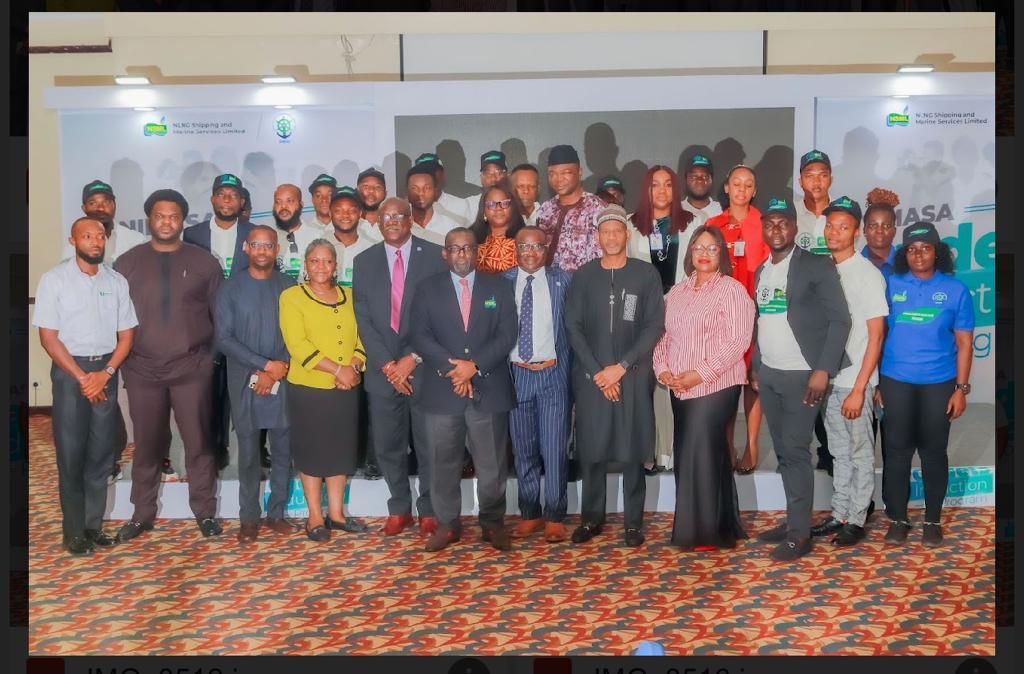
Photo From 3rd Left (Front row): Supervisor, Human Capital Development, Nigerian Content Development and Monitoring Board, Sallahudeen Muhammed; General Manager, Human Resources, NLNG, Mrs Bamitale Frinle; Director, Special Duties,Nigerian Maritime Administration and Safety Agency,NIMASA, Isichei Osamgbi; Managing Director/CEO NLNG Ship Management Limited, NSML, Abdulkadir Ahmed; Director, Data Management Services NIMASA, Chris Amakulo;Deputy Director, Maritime Labour Services, NIMASA, Aliyu Lawan; Ag. Head Maritime Labour Services, NIMASA, Yetunde Collins and other participants during the Induction Ceremony by NSML for 50 of NIMASA's Romanian trained NSDP beneficiaries in Lagos.
NIMASA, NSML partner to train 150 NSDP cadets
*NSML inducts 50 cadets for CoC training, examinations.
*We are committed to industry capacity development- Jamoh.


Photo
From 3rd Left (Front row): Supervisor, Human Capital Development, Nigerian Content Development and Monitoring Board, Sallahudeen Muhammed; General Manager, Human Resources, NLNG, Mrs Bamitale Frinle; Director, Special Duties,Nigerian Maritime Administration and Safety Agency,NIMASA, Isichei Osamgbi; Managing Director/CEO NLNG Ship Management Limited, NSML, Abdulkadir Ahmed; Director, Data Management Services NIMASA, Chris Amakulo;Deputy Director, Maritime Labour Services, NIMASA, Aliyu Lawan; Ag. Head Maritime Labour Services, NIMASA, Yetunde Collins and other participants during the Induction Ceremony by NSML for 50 of NIMASA’s Romanian trained NSDP beneficiaries in Lagos.
The Nigerian Maritime Administration and Safety Agency (NIMASA) has signed a training agreement with the Nigerian Liquified Natural Gas, NLNG Ship Management Limited, NSML, to facilitate Certificate of Competency (CoC) examinations for beneficiaries of the Nigerian Seafarers Development Program (NSDP).
The NSDP is a sponsored intervention programme being implemented by NIMASA to grow capacity of young Nigerians to be certified as seafarers with global recognition and acceptance, thus bridging the gap in the dearth of seafarers globally.
The CoC examination is the final stage of the NSDP training, culminating in the acquisition of the CoC license which potentially opens the doors of global employment opportunities for the cadets.
Speaking at an induction ceremony by NSML for 50 of NIMASA’s Romanian trained NSDP beneficiaries , the NIMASA Director General, Dr Bashir Jamoh OFR, highlighted the success of the collaboration between both parties in fostering the development of Nigerian seafarers.
The NIMASA DG who was represented by the Agency’s Director Special Duties, Isichei Osamgbi,noted that NIMASA sincerely appreciates NSML for their leadership and vision in partnering the Agency to support the development of seafarers and promotion of our local content onboard their vessels. In his words “It is worthy of note that a good number of NSDP Officers trained onboard NSML vessels are now employed by the company. Today, we are proud to announce that 150 Romanian-trained NSDP cadets have concluded their mandatory onboard sea training and are ready to proceed for the Certificate of Competency (CoC) training and examinations. The signing of this Training Agreement between both parties resulting in the commencement of CoC for the first batch of Romanian trained cadets, will go a long way inensuring all backlogs of cadets awaiting CoCs are cleared”. He urged other organizations in the industry to take a cue from NSML and give opportunities to aspiring Nigerian seafarers to acquire knowledge and gain experiences to excel in the field.
The Permanent Secretary Federal Ministry of Marine and Blue Economy, Dr. Magdalene Ajani, while speaking at the ceremony charged the lucky Cadets to be worthy ambassadors of Nigeria.
According to Dr. Ajani who was represented by Mrs. Ekanem Saila, a Deputy Director from the Ministry noted that the collaboration between NIMASA and NSML was a welcome development and the outcome of discussions which have been on for some time.
On his part, the Managing Director/CEO of NSML, Abdulkadir Ahmed, said the organisation is sponsoring 50 of the cadets to the South Shield Marine School in the UK for a 12 month programme to get their certificates of competency required to trade on vessels globally.
He said this is aimed at addressing the dearth of Nigerian seafarers on ocean going vessels and the need to meet indigenous manning requirements in Coastal and Inland Shipping (Cabotage).
He stated that the training programme in the UK is the gold standard in maritime training, noting that with the certificate of competencies, the cadets will become qualified seafarers and work on any vessel globally.
“So our support here is really in coordinating and ensuring we actually support these cadets back to back because the goal is to ensure they come out with good Certificates of Competency and to ensure they have a career in the global shipping marine sector,” he stated.
Ahmed also noted that, with the emerging transition in the shipping and maritime industry, such as in energy and decarbonisation, which requires bringing in new technologies, it is important that seafarers continue to upgrade their skill sets and train on new technologies to be abreast of new developments.



